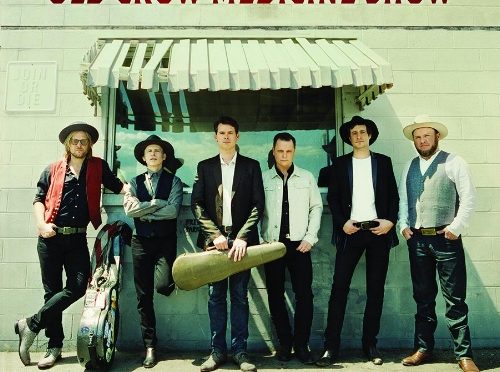Rating: 8/10
The South has her fair share of scars and stains and things her people would like to forget. It’s easy, in trying our best to forget and even eradicate that history, to also let go of her heritage and her culture and the things that make her unique. It’s easy to think of country and bluegrass music, as well as Southern culture, as marks of a backward and rural people who need to be brought into the present, and the people that perpetuate these stereotypes only complicate these issues. The South was and is not perfect, but Old Crow Medicine Show are living proof of what makes Southern music beautiful, and why its unique and rich culture is embraced by many and should be preserved.
It’s not an overarching intent with this project or with Old Crow Medicine Show, like something like Southern Family, so don’t let that mislead you—it’s just what comes naturally from listening to this record and to this string band in general. WE have “Child of the Mississippi,” one of the brightest, most fun, energetic songs here, portraying a narrator who grew up on the Mississippi River, “just a barefoot boy born in Dixieland.” The river is in his blood, even more a part of himself than his family. Immediately following that is “Dixie Avenue,” featuring some cheerful harmonica and referencing a couple who falls in love by the light of the Southern moon and eventually settles down in their sleepy little town, buying a house on Dixie Avenue. And then, after these two ridiculously infectious songs, everything slows down in the heart of the album for the premise of it all and one of its highlights, the five-minute ode to the South known appropriately as “Look Away.” Using those well-known lines from “Dixie,” this song paints a picture of a world-weary man returning to his Southern homeland “where the cotton grows” after many years away. Piano licks accentuate this song, as well as the ever-present fiddle and rich harmonies, both such integral parts of the sound of Old Crow Medicine Show.
Speaking of fiddle, there’s a track here called “Shout Mountain Music,” which is basically an “f you” to anyone that wants them to change their sound, even referencing Nashville. This features some fiddle and banjo up front in the mix, despite the advice that these instruments might not belong. They double down on this sentiment with the fiddle instrumental “Elzick’s Farewell,” which anyone who knows anything about me at all knows I love on principle. The fiddle is a rhythmic instrument often for Old Crow, but it’s also used excellently melodically here in “Old Hickory,” a song about a troubled man named Virgil Lee who found his solace in playing music. The Southern references are here as well, as we see “kindly” for “kind of” and “too big for your britches”–as I say, it’s not a specific or purposeful intent of Old Crow, but the Southern language is a unique feature of this album.
It’s nice to be able to have positive words to write about Dave Cobb as well. The man did a fantastic job here, letting the strings and the harmonies and the band’s personality shine. The fun songs, which make up the majority of the album, are vibrant, and each instrument is clearly heard in the mix. The interaction between the band members on tracks like “Flicker & Shine” adds another layer of infectiousness, and Cobb did a good job of capturing that. He didn’t overproduce the more serious songs either, allowing the harmonies and lyrics to be the main focus. The closer, “Whirlwind,” said to be inspired by a couple who were married for many years and stayed together during hard times in the rural South, concludes this album elegantly and may be one of the best songs here.
Actually, the best song is really hard to pinpoint on this album because aside from three songs here, I love all of these selections. This album is literally filled with standout songs–it’s not a solid record of good material, it’s an album of mostly excellent tracks. There’s only one I could do without completely, and that’s “The good Stuff,” as that one crosses the line from infectious to obnoxious. “Old Hickory” and “Homecoming Party” are not quite as strong as the rest, mostly in terms of the writing. “Old Hickory,” as mentioned, is definitely elevated by the instrumentation, and “Homecoming Party” carries an interesting theme of getting off the road and not really being welcomed at home, but both songs just don’t stand out as much lyrically. Still, these are really minor nitpicks on a very solid album.
Overall, this is a really fun, vibrant record that embraces and captures Southern culture in the best way. It’s mostly upbeat and infectious, but there are enough serious moments to add some variety. The production is crisp and tasteful, the writing is strong, and the instrumentation, as you’d expect from an Old Crow album, is stellar. Not that anyone should be surprised by any of this, but Volunteer is another great release from Old Crow Medicine Show and an excellent case for the preservation of Southern music and culture.

I enjoyed this group.